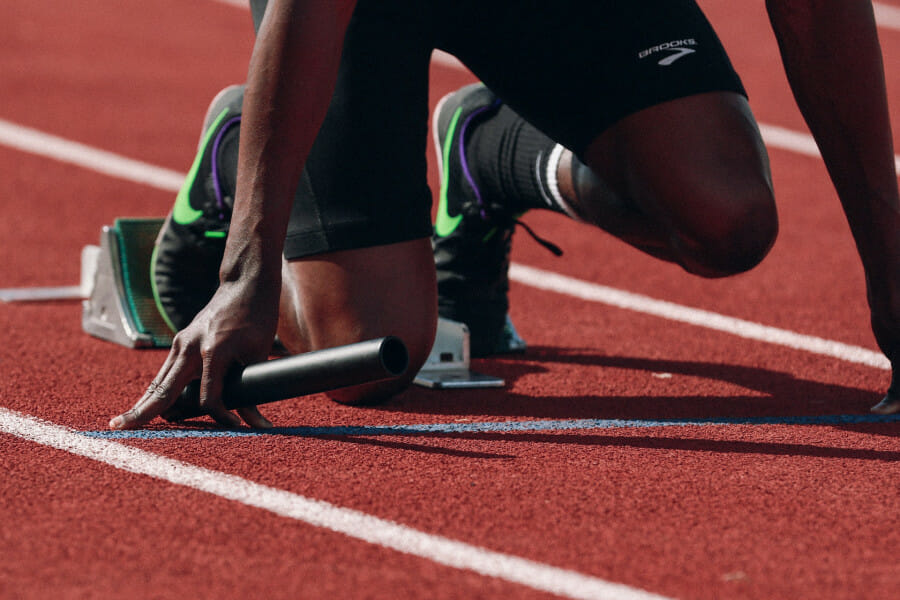See How Black Athletes Are Reclaiming Racist Narratives Within Sports
I have been an athlete my entire life. It is part of what’s defined me, ever since my mom signed me up for gymnastics class when I was five. I think of myself as Black first, female second, athlete third, and that’s how I describe myself: Black Female Athlete. But this title comes with a lot of weight. Systems of racism have existed in this country for hundreds of years, and sports are no exception. If you are a Black athlete in America, chances are you have experienced some sort of racism or microaggression within your sport. And I am not immune.
I grew up in the Midwestern suburbs, and quickly realized I was treated differently because of the color of my skin. When I was in elementary school, a childhood friend told me I couldn’t sleep over because her parents were worried their neighbors would see a Black person going in and out of their house. I try to forget incidents like that, but it’s impossible. I’ve carried the weight of them with me through my life and even onto the playing field, where fresh indignities awaited me.
In high school, I ran track and field, and the coaches saw my skin color and body type and typecast me as a sprinter and jumper. Other incidences of racism weren’t overt, but they didn’t sting any less. And I knew it was best not to say anything if I wanted to move forward in my sport. A lot gets swept under the rug when you’re fearful that speaking out means not being able to perform or compete.
Consider Tiger Woods: When he won his first Masters golf match in 1997, fellow golfer Fuzzy Zoeller called him a “little boy” and said, “You pat him on the back and say congratulations and enjoy it, and tell him not to serve fried chicken next year…or collard greens or whatever the hell they serve.” Woods dismissed the remarks to move forward, probably believing that some battles are not worth fighting.
A lot gets swept under the rug when you’re fearful that speaking out means not being able to perform or compete
The racism Black athletes experience isn’t limited to sports themselves; it’s rooted in the way Americans have viewed Black people’s bodies for centuries. Long-held stereotypes about the power of the Black body—its strength and endurance—date back to the 17th century. Enslaved Black people (especially men) were valued, sold, and bought for the strength of their bodies and their ability to do manual labor, not for their intellect or mental acumen. Fast forward to modern-day, and the media still tends to describe Black athletes in terms of their physical strength versus their tactical prowess—brute force over strategy.
Tennis is another sport that is historically—and some would say nostalgically—white, and when Black athletes win, their success is often attributed to physical strength rather than talent. Think about how Serena Williams’s power always gets highlighted over her ability to come back mentally and strategically when she’s down a set.
And that type of racism begins long before the professional level. I was also a gymnast in high school—the only Black female on the varsity team—and I remember talking to one of my younger white teammates about diversity at our school, which was predominately white. She told me that I wasn’t “really” Black, and I looked at her in confusion and corrected her. I think what she meant was that I looked mixed, so, in her mind, that didn’t really count. Or maybe she thought I didn’t talk or act in a way that fit the stereotype she had of Black people. But the message was clear: To her, my Blackness was dismissable. White people have been defining our Blackness for centuries, so I guess I shouldn’t have been surprised that my experience, at a Midwestern high school in the ’90s, would be any different.
I can also think back to my experience as a college athlete, where I was on the track and field team. Sometimes, people assumed the only reason I got into Georgetown University was because I was an athlete, but I walked on. I still remember how surprised the former dean of my high school—who was also my history teacher and knew my discipline as a student—looked when I told her I was going to Georgetown. When I saw her face, my heart sunk—I felt undeserving and unworthy, and I could tell she didn’t expect a Black student to succeed outside of athletics.
We must be able to reclaim how Black bodies are seen in sports, which means undoing a narrative that’s been in place for 400 years
It’s a challenge to undo decades of stereotyping, and it’s a burden for many athletes. Knowing that you will always be asked to talk about racism is a mental hurdle that can get in the way of performance. And even if an athlete has the mental fortitude to perform without worrying about the weight of representing their race, they know that it will still be part of their story if they succeed. When Black athletes succeed, they’re less likely to be promoted to leadership positions on teams or hired as coaches.
Consider football and how long it took for there to be a Black coach or Black quarterback. I can still remember my Dad’s excitement, in 1992, when he found out that Dennis Green, a Black man, was named the coach of the Minnesota Vikings. We lived in Minneapolis, and seeing a Black man as coach was unusual at the time.
Ultimately, there is no easy way to move forward unless we continue to dismantle systemic racism itself. It starts by looking inward at our preset racial biases within sports. Athletes come in all shapes, sizes, and colors. What gives me hope is that sport can continue to be a way to unify globally. But we must be able to reclaim how Black bodies are seen in sports, which means undoing a narrative that’s been in place for 400 years. It won’t be easy, but it’s necessary. I deserve the freedom to define myself as an athlete on my own terms.















